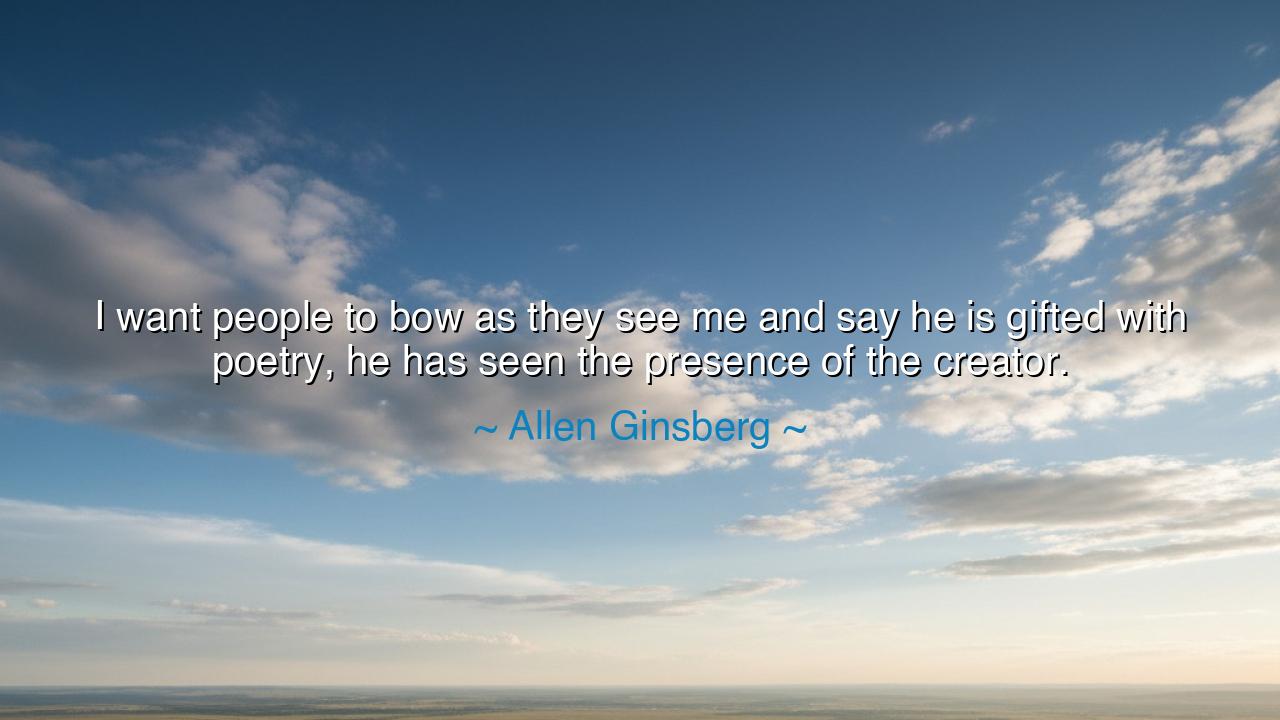
I want people to bow as they see me and say he is gifted with
I want people to bow as they see me and say he is gifted with poetry, he has seen the presence of the creator.






“I want people to bow as they see me and say he is gifted with poetry, he has seen the presence of the creator.” Thus cried Allen Ginsberg, prophet of the Beat Generation, whose voice was wild with vision and hunger for transcendence. His words are not only boast, but prayer: that his poetry might be recognized not as mere craft, but as revelation—that through his words, others might glimpse the divine spark that hides behind the veil of ordinary life.
The meaning of this saying lies in the ancient role of the poet as seer. To Ginsberg, the true poet is not only an arranger of words, but a visionary, one who enters the mystery of existence and returns with fire in his hands. When he speaks of wanting people to bow, he does not speak merely of vanity, but of recognition—that the gift of poetry is sacred, that to write truly is to bring evidence of the creator’s presence into the human realm. The bow is not to the man but to the vision, to the power that flows through him.
The origin of this desire is found in Ginsberg’s own spiritual journey. Immersed in the chaos of modern America, he sought transcendence in art, in love, in Eastern philosophy, and in ecstatic states of mind. His poem Howl was both a cry of anguish and a hymn of revelation, exposing the brokenness of his age while pointing to the divine that still glimmered amidst madness. In declaring himself a messenger of the creator’s presence, he stood in the lineage of prophets and shamans, who bore the burden of revealing what others could not see.
Consider the story of William Blake, who centuries before also claimed visions of angels and the divine. He too wished to be seen not merely as a craftsman but as a visionary, a man touched by fire from beyond. Like Ginsberg, Blake was often dismissed as eccentric or mad. Yet his poetry and art endure precisely because they carried the weight of revelation. Both men remind us that poetry at its highest is not entertainment but prophecy—the voice of the infinite breaking into the finite.
The lesson here is that we must honor poetry as more than ornament. True poetry carries glimpses of eternity, and those who write it carry a heavy calling. If we, too, would touch the presence of the creator, we must learn to look past the surface of life, to listen in silence, to perceive what hides beneath appearances. The poet’s task is to remind the world that there is more—that behind the noise of markets and machines, there breathes a living spirit that longs to be named.
Practically, this calls us to cultivate reverence for both poetry and vision. Read poems not only with the mind but with the soul, asking what truth they reveal about the divine presence. Write not only to impress but to uncover—to peel away the veil from your own experiences and show others the glimpse you have seen. And when you encounter a true poet, recognize the gift, not with empty praise, but with gratitude, for they bring to light what is hidden from many.
Thus the teaching endures: Ginsberg desired not fame, but recognition that his gift was holy—that through poetry, he had touched the creator. Whether in his cry or in Blake’s visions, or in the chants of the ancients, the truth remains: the poet is a bridge between heaven and earth. Let us then honor the bridge, and perhaps walk upon it ourselves, seeking not only words, but revelation. For in poetry rightly received, we too may see the presence of the creator.






VABui Vu Van Anh
Ginsberg’s desire to be recognized as ‘gifted with poetry’ and touched by the divine is a bold statement. It raises the question—can poetry truly be a spiritual experience, one that connects the poet with something greater than themselves? Or is Ginsberg’s request for this kind of reverence a reflection of the societal tendency to elevate certain individuals as ‘messengers’ of higher truths? How do we balance artistic ambition with the humility required to create without seeking constant validation?
QTQuynh Thuy
This quote from Ginsberg seems to reflect his intense ambition and belief in the transcendent power of poetry. But does this desire for reverence mean that he sees poetry as a higher calling? Or is it a reflection of a deeper insecurity about the value of his work? Could seeking such admiration be part of the artist’s drive to justify their creative journey, or does it simply reflect a need for acknowledgment from others?
NLYen Nhi Nguyen Le
There’s something deeply ambitious in Ginsberg’s quote. The idea of wanting to be acknowledged as having ‘seen the presence of the creator’ suggests a profound belief in the power and purpose of poetry. But do you think that the desire for such acknowledgment can sometimes overshadow the humble nature of true artistic expression? Can an artist stay true to their craft while seeking external validation, or does that compromise the authenticity of their work?
NTThuu Hangg Nguyen Thii
Ginsberg’s desire for recognition in such a grand way is fascinating. It makes me wonder—what drives an artist to seek such reverence? Is it the need to be seen as a channel for something divine, or is it more about the desire to have their creative power acknowledged by the world? Do you think artists like Ginsberg feel that their poetry carries an inherent truth that must be recognized, almost as if it is a calling?